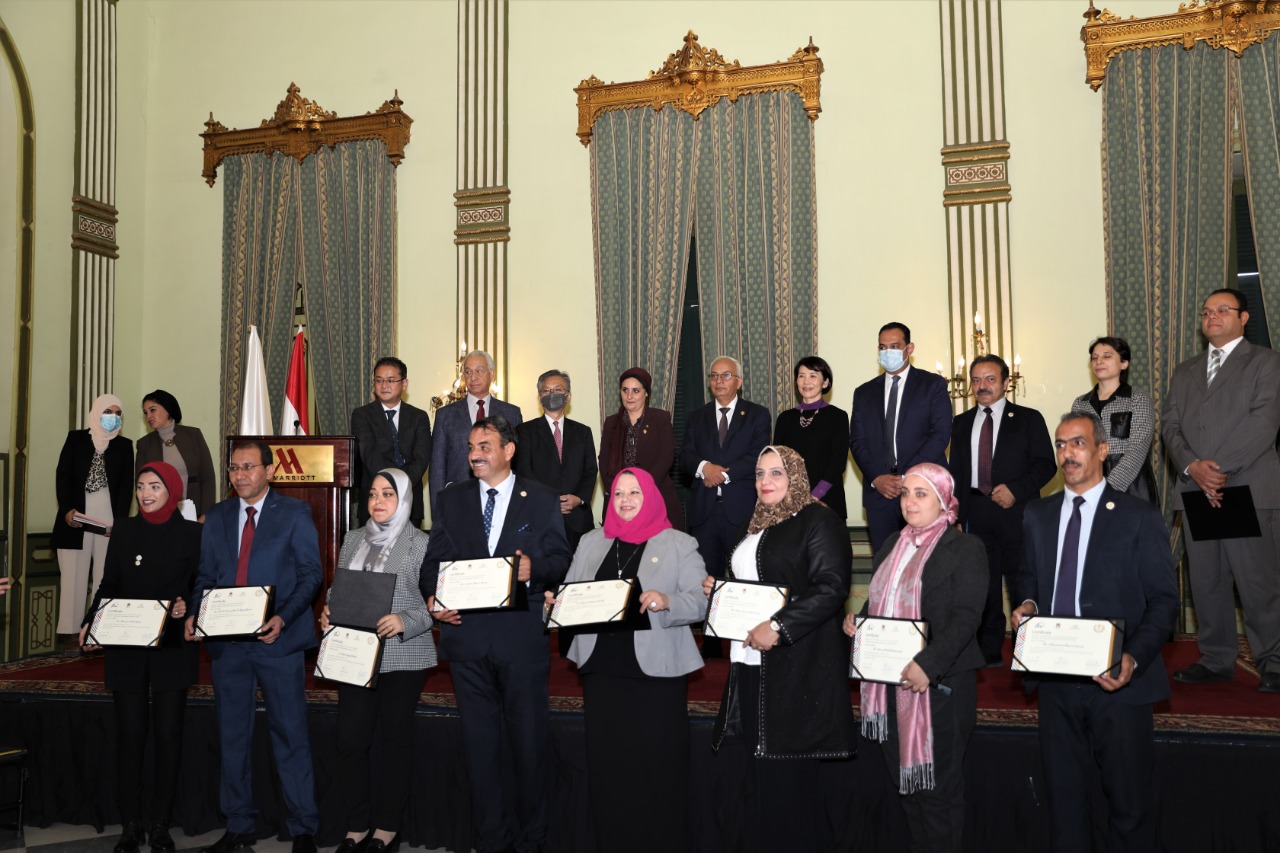"Education" celebrates the adoption of the first Egyptian team to implement tokatsu activities in cooperation with the Japanese International Cooperation Agency "JICA"

Today, the Ministry of Education and Technical Education, in cooperation with the Japan International Cooperation Agency (JICA), celebrated the ceremony of handing over certificates for the first batch of the accredited team to implement Japanese tokatsu activities.
The ceremony was attended by Dr. Reda Hegazy, Deputy Minister for Teachers’ Affairs, Dr. Ahmed Daher, Deputy Minister for Technological Development, Dr. Hani Helal, former Minister of Higher Education and Secretary-General of the Steering Committee of the Egyptian-Japanese Partnership for Education, Oka Hiroshi, Japanese Ambassador in Cairo, and Ms. Emoto Sachiko, First Vice President of the Japan International Cooperation Agency (JICA), Nevin Hammouda, Advisor to the Minister for Strategic Relations and Supervisor of Egyptian-Japanese Schools, Dr. Essam Hamza, Head of the Arts and Culture Center at the Egyptian Japanese University of Science and Technology, on behalf of Dr. Ahmed El-Gohary, President of the Japanese University, and Omura Yoshifumi, Head of JICA’s office in Egypt.
In his speech, delivered on his behalf by Dr. Reda Hegazy, Deputy Minister for Teachers’ Affairs, Dr. Tarek Shawky welcomed the attendees, saluting and appreciating the government and people of Japan, stressing the depth of the friendship between the two ancient Egyptian and Japanese peoples, which translates into various forms of fruitful cooperation. In various fields.
Dr. Tariq Shawky explained that in order to preserve the philosophy and identity of Japanese activities, there was a need to grant leave to workers with this philosophy, which needs to work through successive stages; Therefore, it was agreed with JICA to cooperate in order to issue accredited certificates for those who provide tokatsu activities, for the first time in the world. Where there is no equal.
He pointed out that this certificate will qualify the holder to work in tokatsu activities, train them and qualify their employees to practice them professionally in Egypt at all levels; To extend in the future to include those responsible for implementing tokatsu, schools that have tokatsu activities, or teachers working in those schools.
He stressed that the joint cooperation with the State of Japan in the education sector began after the visit of President Abdel Fattah El-Sisi, President of the Republic to Japan in 2016, and his briefing on the inspiring Japanese experience in the field of education. (100) new operating schools based on the new model, (100) government schools, and (12) pilot schools in which the implementation of the tokatsu activities experience began in its early stages.
The minister stressed that the interest in expanding the establishment of Egyptian-Japanese schools comes from the premise that they have three main advantages: the essence of Japanese education lies in the integrated personality of the child, which is also consistent with the goal of the new educational program 2.0, which is concerned with developing students’ academic abilities and developing morals; In order to raise generations that abide by the rules and laws, and respect the feelings of others, the group learning formula develops communication skills with others.
And he continued, so we took a decision to add tokatsu activities as a component of the new Egyptian curriculum, which the Ministry seeks through its application to reform the educational system in various schools in Egypt.
Today, we celebrate the adoption of the first accredited Egyptian team in Egypt for Tokatsu activities, according to specific procedures and an unprecedented scientific methodology that was established in Egypt. The adoption of this team is to reduce the unstructured jurisprudence, whether from individuals or institutions, carried out by those who are not qualified to talk about the activities of the tokatsu.
The minister also stressed that the ministry is moving towards a comprehensive development of the curriculum, mechanisms and tools for evaluation. To be in line with the requirements of development at the local, regional and international levels, and to rely on technology; To be the gateway to international competitiveness; In order to achieve the goals of the sustainable development strategy “Egypt Vision 2030”.
Emoto Sachiko praised the cooperation with the authorities that contribute to the quality of education in schools and the activities of Tokatsu, and the provision of many Japanese experts, teachers and technicians who have long experience in this field, as well as private private companies that support these different ideas here in Egypt, thanking Dr. Tarek Shawky, Ms. Nevin Hammouda, and all those working in the success of this system, pointing out the importance of this initiative to enable the sustainable development of human resources so that tokatsu activities are developed through which the school curricula are implemented on an ongoing basis by Egyptian teachers in proportion to the Egyptian educational circles.
For her part, Nevin Hammouda, Advisor to the Minister for Strategic Relations and Supervisor of Japanese Schools, confirmed that this project from the beginning was aimed at establishing some schools, but we aspire to expand this project and increase the number of schools, and we worked on obtaining a leave for those who work in tokatsu activities, noting that the essence of Japanese education is consistent with the goal of the new Egyptian educational program 2.0, and we also seek to reach faculties of education to qualify teachers for this activity, in addition to documenting and accrediting schools wishing to implement this activity.
At the end of the ceremony, the team accredited to implement the Japanese tokatsu activities was honored, they are Dr. Aziza Rajab Khalifa, Sahar Hamed Nasreddin, Abul-Hassan Abul-Majd Ahmed, Dr. Ahmed Tawfiq Al-Husseini, Dr. Ashwaq Abdel-Jalil Ali, Asmaa Mustafa Mohamed, Hussein Mounir Morsi, and Mohamed Ahmed Hamza, and Dr. Shaima Nabil.
